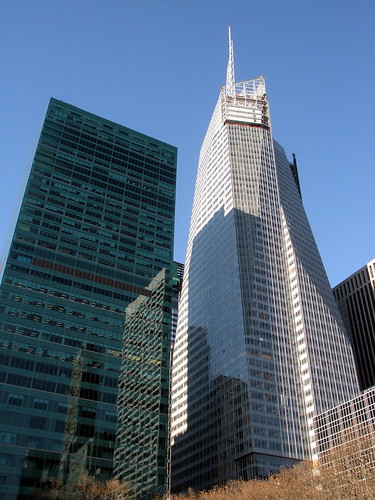
GREEN BUILDING NEWS
|
Did You Know...? The Northeast blackout of August 2003 affected an estimated 10 million people in Ontario and 45 million people in eight U.S. states.
 It was a seasonally hot day (over 31 °C or 88 °F) in much of the affected region, and the heat played a role in the initial event that triggered the wider power outage. The high ambient temperature increased energy demand, as people across the region turned on fans and air conditioning. This caused the power lines to sag as higher currents heated the lines.
Source: www.wikipedia.org
|
|
Great Forest Gives Back
Great Forest is a proud supporter of the nonprofit Blacksmith Institute, which works to solve life-threatening pollution problems in the world's worst polluted places. Blacksmith is currently engaged in over 40 cleanup projects in 19 countries.
Read the 2009 World's Worst Polluted Places report: 12 Cases of Cleanup and Success.
|
About Great Forest
Great Forest provides sustainability consulting and project management expertise
To date Great Forest has worked with more than half of all commercial office space and hotels in Manhattan and over 1,500 buildings across the country, covering approximately 350 million sq. ft. Services include: Contact Us Great Forest, Inc.
2014 Fifth Avenue
New York, NY 10035
Ph: (212) 779-4757
Fax: (212) 779-8044
www.greatforest.com
Improve Environmental Performance, Reduce Costs
| |
|
This summer the northeast has been gripped by a crippling heat wave. We're taking this opportunity to remind friends and clients that there are many opportunities to go greener - from upgrading your existing building using LEED green building principles to finding opportunities to reduce energy use through a more efficient office layout.
Did you know that closing your blinds on windows during the day can reduce up to 45% of the building's heat gain in the summer? That means the air conditioning does not need to work as hard to get the building to a comfortable temperature; hence, energy (and cost) savings.
Stay cool and green this summer,
--The Great Forest Team |
Great Forest Works with NY State to Foster Sustainability
NYSP21 is a statewide initiative focused on the development of sustainable businesses and organizations, including government agencies and nonprofit institutions. Check their site for updates on education workshops and training programs held around the state.
Anna Dengler, Great Forest's Director of Sustainability, was the keynote speaker for the event. She offered an overview of best practices involved and gave examples of how to reduce energy, water and waste through efforts such as using an efficient office layout. Amy Marpman, Great Forest's Director of Recycling and Maintenance Services, spoke about how to increase diversion ratios at no added cost by streamlining recycling programs. The case study presented showed that effectively using a deskside set-up with one bin for paper only increased the recycling rate by 20% and eliminated the need for plastic can liners. |
Presentation to Students on Green Building in NYC
In mid-July Great Forest's Nate Kimball gave a talk to an undergraduate UCLA class about green building in New York. The class, entitled UCLA in New York, focused on comparing New York City's green efforts to Los Angeles' efforts. Nate presented case studies of new buildings that are LEED certified such as Bank of America, Hearst, and the New York Times building. He then discussed PlaNYC, the Greener, Greater Buildings Plan, the Green Codes Task Force, and how current legislation will impact energy use in buildings in New York City.
"The students were surprised at how much New York is doing behind the scenes to green its buildings," said Nate. "They were very interested in comparing NYC and LA in terms of green building education." The talk was held at the American Institute of Architects in New York, and the course instructor was David Halle.
|
 GREAT FOREST Q&A GREAT FOREST Q&A
Q: I have the right recycling and trash bins, now what do I do?
 A: Last month's Q&A explained some of the characteristics to look for when purchasing the best waste and recycling bins. But proper recycling behavior depends, in part, on having the right bins located correctly. A: Last month's Q&A explained some of the characteristics to look for when purchasing the best waste and recycling bins. But proper recycling behavior depends, in part, on having the right bins located correctly.
Some things to consider:
Kitchen and cafeteria spaces may require many trash bins, or compost bins if you have a composting program. If your office has a recycling program for cans and bottles, place a receptacle nearby for these materials.
Other high-traffic areas such as copy rooms and conference rooms may require more paper recycling bins and fewer, if any, trash receptacles.
Often, placing trash and recycling bins next to each other reduces improper disposal of recyclables in trash bins. If possible, emptying trash bins frequently will reduce contamination in nearby
recycling bins. When your office hosts an event with food provided, ensure there are enough trash bins to accommodate the nonrecyclable trash; but don't forget about the recyclables!
Recycling is easy when you have consistent and well-labeled bins located throughout your office.
Did you know that Great Forest can also help you decide what bins are best and how to label them in the best way? Tune in next month when we discuss how to improve your recycling program with proper education and signage.
|
|
|
|
|